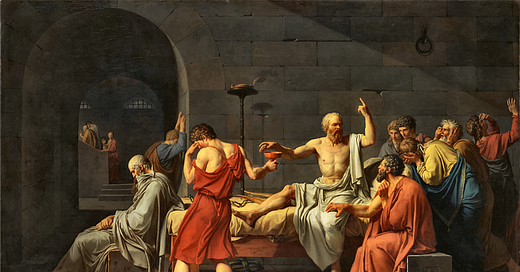Many people are unaware that C. S. Lewis is often considered a Platonist. In The Last Battle, he mentions Plato directly. A character, upon entering Narnia’s heaven, says “and of course it is different; as different as a real thing is from the shadow or as waking life is from a dream…It’s all in Plato, all in Plato” (Lewis, p. 105).
But why would Lewis include such a direct yet ambiguous reference to Plato? I believe much of the answer can be found in his Phaedo, in which he documents the last conversation his teacher, Socrates, has before his execution by poison at the hands of the Athenian government. In the Phaedo, Socrates discusses immortality, the meaning of death, and the soul’s relation to the body, through various arguments and comparisons.
Naturally, Socrates felt a lot of anguish at being condemned to death by the people he loved, and facing death is certainly never easy. But his friends describe him to be the bravest and wisest man they know, even to the end. Notice in this painting how the only one who isn’t crying is Socrates. What causes such a man to find such strength and courage in such a time of suffering? During his trial in the Apology, he says that “A good man cannot be harmed either in life or in death, and his affairs are not neglected by the gods” (Plato, 42). This has an uncanny resemblance to Romans 8:28, “We know that all things God works for the good of those who love him, who have been called according to his purpose” and ten verses earlier, “I consider that our present sufferings are not worth comparing with the glory that will be revealed in us” (Romans 8:18). The latter verse Lewis actually quotes in the last chapter of The Problem of Pain where he writes about heaven; and here, we have our first connection—they both acknowledge the virtues of believing in a greater spiritual realm after death.
Another response to pain they both give evolves around our irrational, emotional humanity. Socrates states, in the Phaedo, that “when anyone’s soul feels a keen pleasure or pain it cannot help supposing that whatever causes the most violent emotion is the plainest and truest reality; which it is not. It is chiefly visible things that have this effect” (Plato, 83b). Similarly, Lewis writes in The Problem of Pain, “I remind myself that all these toys were never intended to possess my heart, that my true good is in another world and my only real treasure is Christ” (Lewis, 107).
Here, we have a beautifully linear consistency. Both find that our current state makes how we approach suffering quite faulty and tainted. Our bodily desires and feelings, however real and passionate they seem, cannot accurately judge what is true and good, for we are tied to this form and this earth, and unable to see the Divine for what it truly is.
Although Lewis struggles with accepting this in A Grief Observed, he concludes the book with a quote from Dante’s Divine Comedy, “Poi si torno all eterna fontana” which means “and then she turned to the eternal fount” (Lewis, 97). So at the conclusion of his book, he turns his focus away from the suffering of this earth to the eternal divinity of the next.
Upon being asked whether he was afraid of dying, Socrates says, “When [swans] feel that the time has come for them to die, they sing more loudly and sweetly than they have sung in all their lives before, for joy that they are going away into the presence of the god whose servants they are” (Plato, 84e). Similarly in one of his letters, Lewis writes, “Has this world been so kind to you that you should leave with regret? There are better things ahead than any we leave behind” (Lewis).
We have eternal joy and the wiping away of every tear, where there will be no more death, or mourning or crying or pain (Revelation 21:4). We have all this to look forward to. Both Lewis and Socrates seemed to come to this conclusion as they experienced suffering, despite coming from backgrounds, belief systems, countries, centuries, cultures, and experiences. They believed in a greater reality outside of our painful world, where, to quote The Last Battle, "I have come home at last! This is my real country! I belong here. This is the land I have been looking for all my life, though I never knew it till now. The reason why we loved the old Narnia is that it sometimes looked a little like this…Come further up, come further in!" (Lewis, 106)




